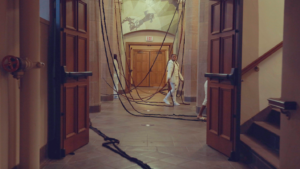What is EADJ ?

What is the Engine for Art, Democracy & Justice?
The Engine for Art, Democracy & Justice (or EADJ for short) is a research initiative started by María Magdalena Campos-Pons, a internationally renowned artist and the Cornelius Vanderbilt Endowed Chair & Professor of Fine Arts. It is a trans-institutional research initiative and an ongoing collaboration between Fisk University, the Frist Art Museum, Millions of Conversations, and Vanderbilt University that explores creative approaches to living together in the American South and Global South.
“The scent of magnolias, barefoot walks in the grass, a sunset on the Acropolis, children swimming in a makeshift pool, a lector of a tobacco factory, a book not yet written, a protest, a love letter, new knowledge of gratitude, of empathy, of tolerance, of solidarity, of freedom, of boundaries, of rituals, of truth, of materials, of mourning. These make up the fuel for our engine. And the mechanism that fires the fuel is a set of questions and discussions on the nature of our common future, of learning, of labor, of proximity, beauty, and Art.
EADJ is an artists’ collective vision of a place where difficult dreams are put to the test, where we discuss and act together, coordinated by a template of social interventions that question how art connects within an array of disciplines. The role of the artist here (within the EADJ research initiative) is mediator, a designer of social arrangements and geographic interactions.
The arts and artists are healers, because making art is a process of decision making, an exercise in judgment and autonomy. Art’s process of making and re-making unhinges inherited obstacles to justice that would otherwise stay put in social and cultural practices. In this way, art makes possible new sensations and new paradigms for cognition. We are a species in transition in which biology and technology – nature and machines – press on and propose new horizons. In this transitional dynamic, it is urgent to foreground the question of justice regarding the body as the geography of human rights, and to propose new arrangements that will replace injustice.”
– Professor Campos-Pons

